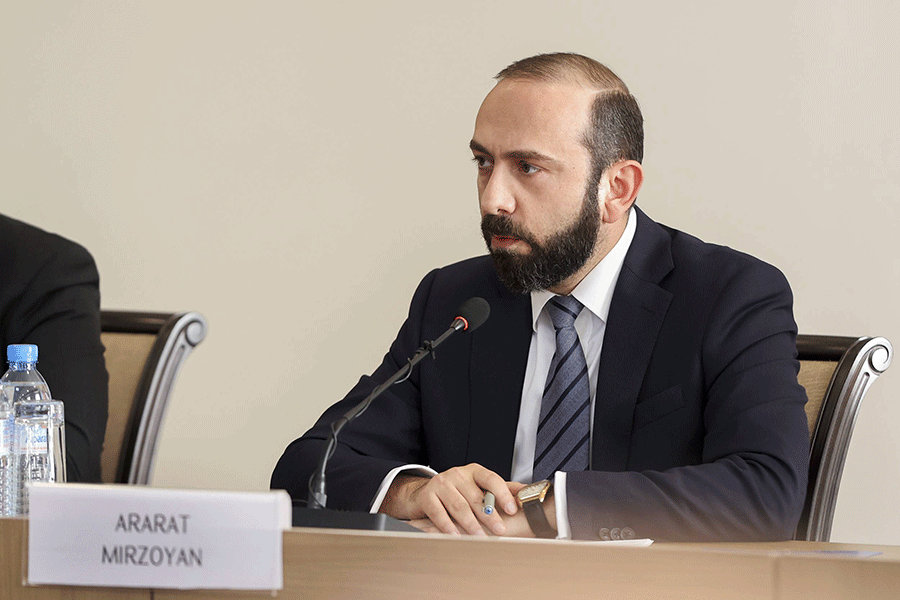Remarks by the Foreign Minister of Armenia at HRC meeting dedicated to the 75th anniversary of the Convention on the Prevention and Punishment of the Crime of Genocide
On December 4, the Minister of Foreign Affairs of the Republic of Armenia delivered remarks at the intersessional meeting of the Human Rights Council dedicated to the 75th anniversary of the Convention on the Prevention and Punishment of the Crime of Genocide.
The meeting was organized based on the tasking of the Human Rights Council’s resolution authored by Armenia.
UN High Commissioner for Human Rights Volker Türk and the Special Adviser of the UN Secretary-General on the Prevention of Genocide and Under Secretary-General Alice Wairimu Nderitu also delivered opening remarks during the event. High-ranking representatives of UN specialized bodies, rapporteurs and well-known experts in the field participated as panellists at the meeting.
Read also
“Excellences,
Ladies and Gentlemen,
Armenia warmly welcomes the participants and panelists of the Intersessional Meeting on the Prevention of Genocide and extends its gratitude to the Office of the High Commissioner for Human Rights for the organization of today’s session.
On 9 December we will mark the 75th anniversary of the adoption of the Convention on the Prevention and Punishment of the Crime of Genocide. Today, 153 UN member states are bound by the universal obligation of punishing and preventing this crime of crimes.
Indeed, the Convention is a powerful crime suppression multilateral treaty. But not only. Today, the obligations emanating from the Convention have been well mainstreamed in the resolutions of the Human Rights Council on genocide prevention.
Against this backdrop, I find it extremely important that the resolutions on Genocide Prevention enjoy wide cross-regional support and consensus in the Human Rights Council. It reflects a larger international consensus on the absolute imperative to prevent genocides through protection of individual and collective human rights of ethnic, religious, racial and national groups.
In this regard, the Human Rights Council is well-placed to be at the forefront of genocide prevention. We hope that the synergies and the cooperation between the Office of the Special Adviser of the Secretary General on the Prevention of Genocide, treaty bodies, and special procedure mandate holders will be further strengthened and institutionalized.
I take this opportunity to highlight the extensive work carried out by Special Adviser Alice Wairimu Nderitu.
Excellences,
I have no doubt that the deliberations at this meeting will once again demonstrate the relevance of mass atrocity prevention in today’s world. The world we live in today is a dangerous place for many ethnic and religious groups, and the intent to destroy them on a certain territory has been manifested worldwide, particularly now when the international security arrangements and human rights mechanisms are in continuous decline.
The very idea of eliminating right holders as the medium of resolving conflicts has never been so “appealing” for perpetrators of crimes as it is today. The conflict situations provide ample environment for perpetrators, who under the guise of another party to the conflict, claim from the international community a treatment equal to one that should be extended to the victims.
Disparity of force has always been a constant feature of genocide. And by saying force, I did not exclusively refer to the military advantage of perpetrators but their ability to use new technologies in disinformation and misinformation in order to dehumanize victims, prepare grounds for deadly actions with their subsequent justification.
One year ago, the 4th Global Forum Against the Crime of Genocide organized in Yerevan considered the role of new technologies in genocide prevention both from positive and negative angles. The Yerevan declaration adopted during the Forum acknowledged that the spread of disinformation and misinformation, particularly on social media platforms, can serve as a new propaganda tool to mislead and spread racism, intolerance, xenophobia, negative stereotyping and stigmatization, to violate and abuse human rights and dehumanize groups on the basis of identity.
Dear friends,
The perpetration of mass atrocities, including genocides, continues to take a considerable time in all its phases. As a matter of fact, the collective punishment of targeted groups takes different forms and manifestations, evolving incrementally in its gravity, including through violations of international human rights and international humanitarian laws, disruption of critical infrastructure, siege and massive violence. Needless to say that many mass atrocities could have been prevented once early warning signals were identified during those phases.
Collective failure should not be a justification for individual inaction for each and every UN member state.
Another important dimension of international responsibility is the international protection of victims, including those forcibly displaced.
Two months ago, the Republic of Armenia provided shelter and means of subsistence to more than 100 thousand refugees, the entire population of Nagorno-Karabakh uprooted from its ancestral homeland. Support of the international community is essential in providing international protection for these victims of ethnic cleansing.
Excellences,
Decades ago, when Armenia assumed responsibility in mainstreaming human rights into genocide prevention, we were driven by our moral duty towards the past. Today, we see that it is not merely about the past, rather our joint efforts are aimed at the present and future: a future of humanity free of hatred, racism, xenophobia and intolerance leading to mass atrocity crimes.
Despite all setbacks of the international human rights and security system, we will continue to actively engage in the Human Rights Council and other multilateral platforms for further elaboration of tools and mechanisms for the prevention of genocides and other mass atrocities.
I thank again the OHCHR and High Commissioner Volker Türk for the organization of the meeting and wish every success to panellists and participants.”
Ministry of Foreign Affairs Government



















































